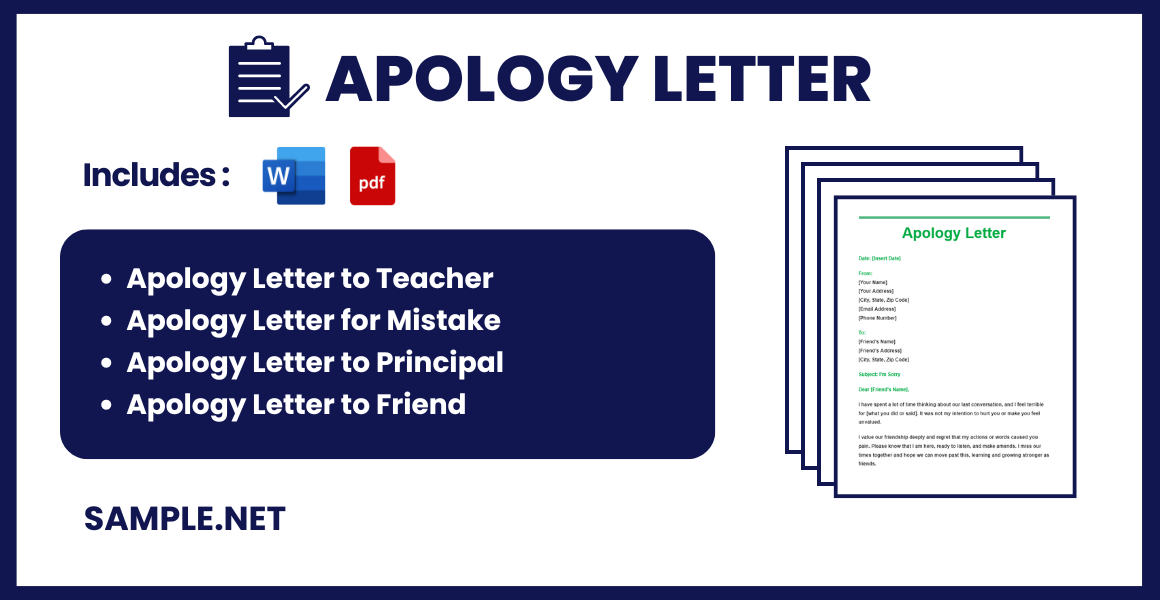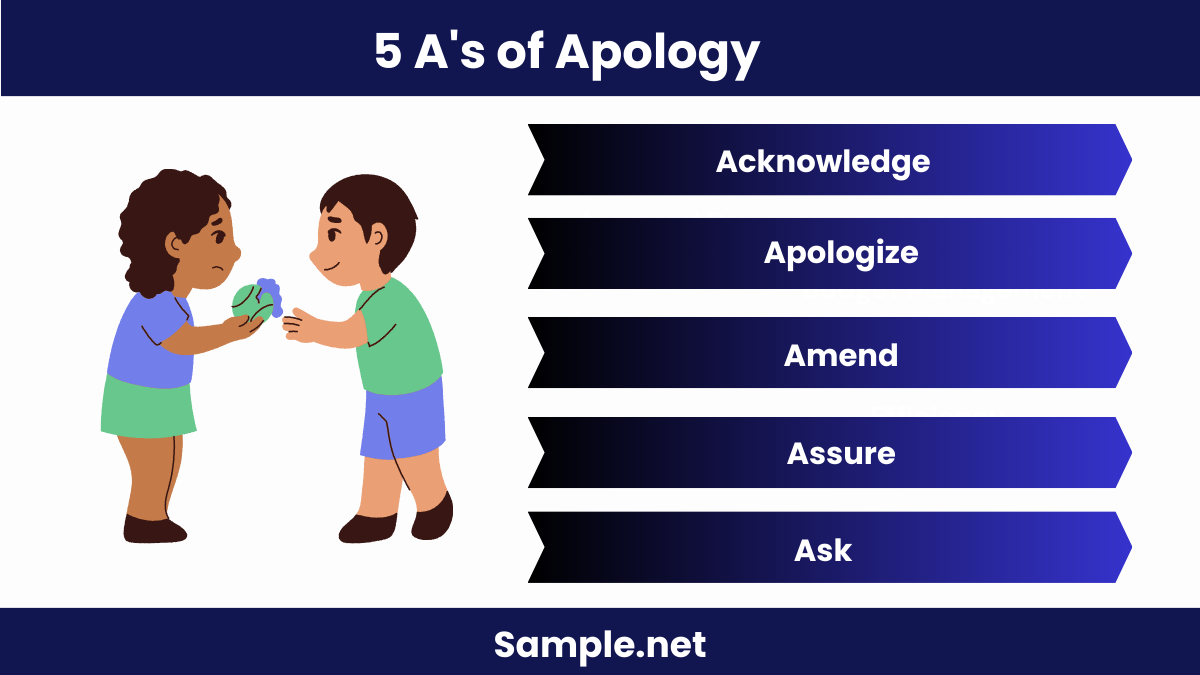Apology Letter Samples
-
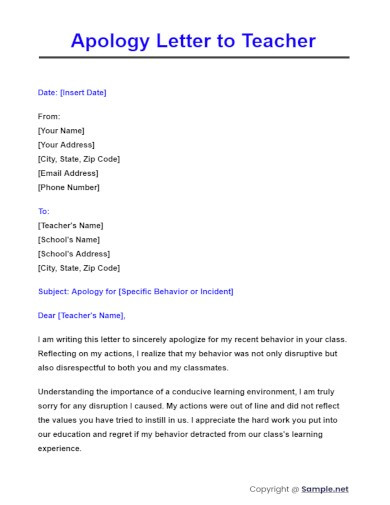
Apology Letter to Teacher
download now -
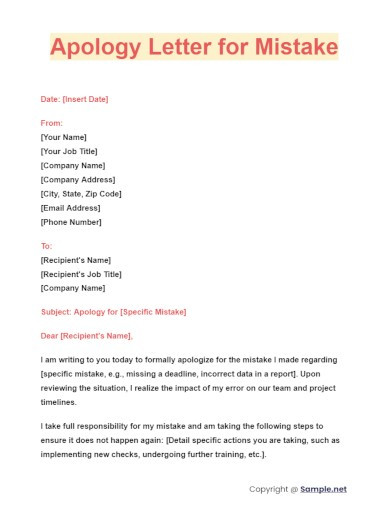
Apology Letter for Mistake
download now -
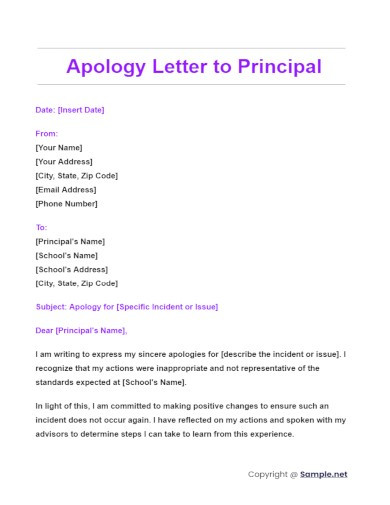
Apology Letter to Principal
download now -
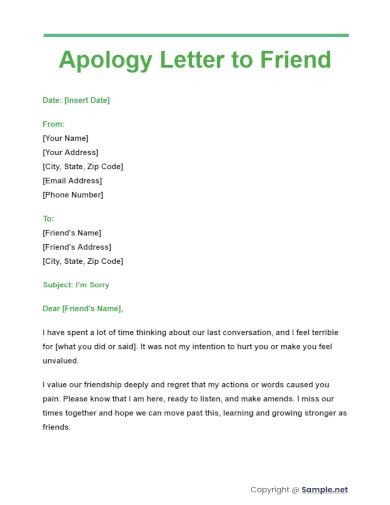
Apology Letter to Friend
download now -
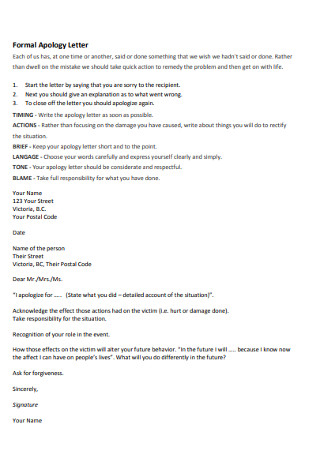
Formal Apology Letter
download now -
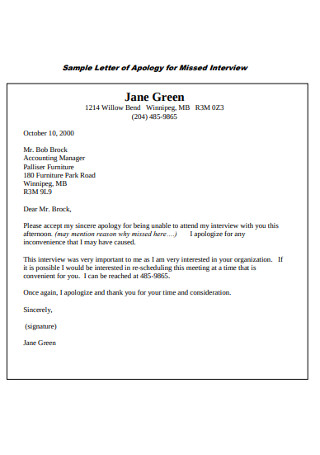
Sample Letter of Apology for Missed Interview
download now -
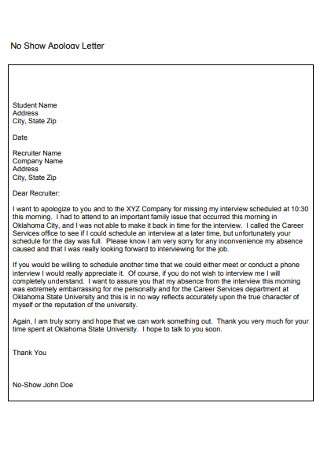
No Show Apology Letter
download now -
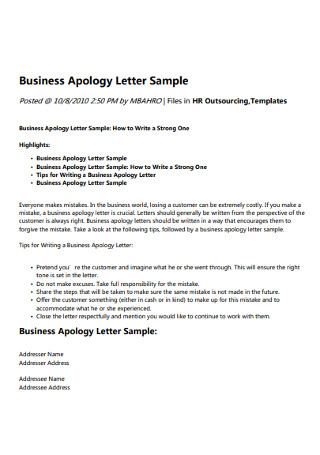
Sample Business Apology Letter
download now -
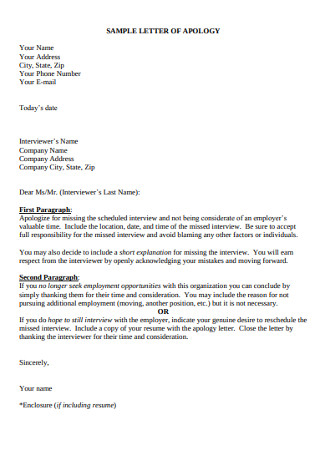
Basic Apology Letter
download now -
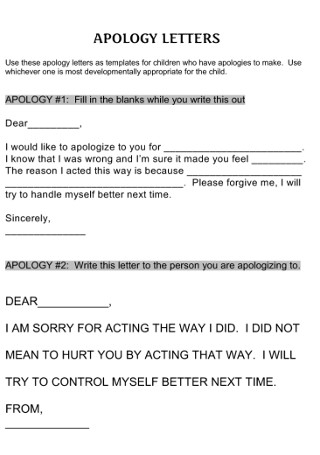
Standard Apology Letter
download now -
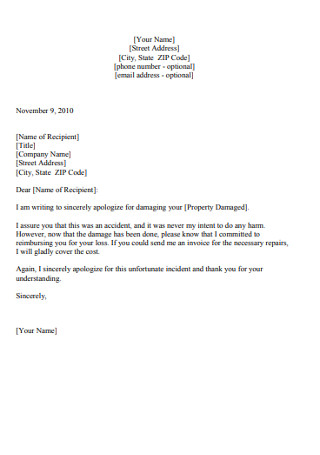
Damaged Property Apology Letter
download now -
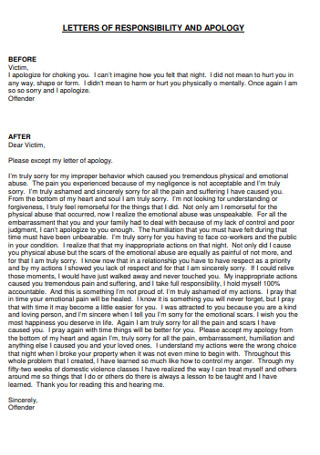
Letter of Responsibility and Apology
download now -
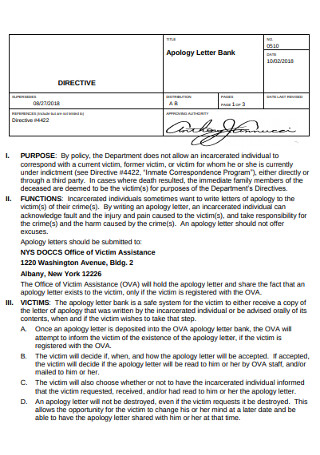
Bank Apology Letter
download now -
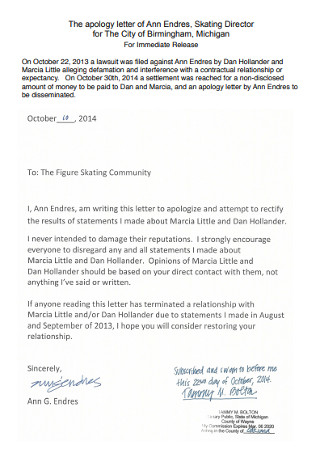
Skating Director Apology Letter
download now -
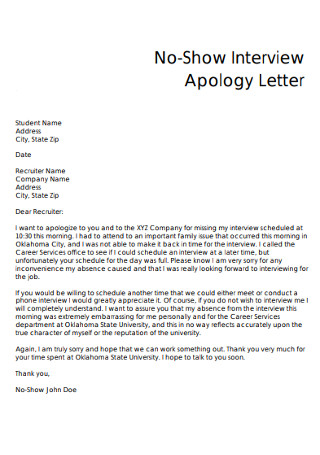
No-Show Interview Apology Letter
download now -
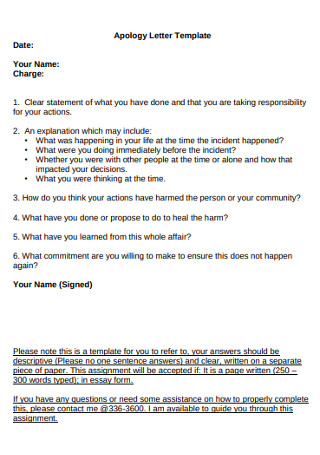
Apology Letter Template
download now -
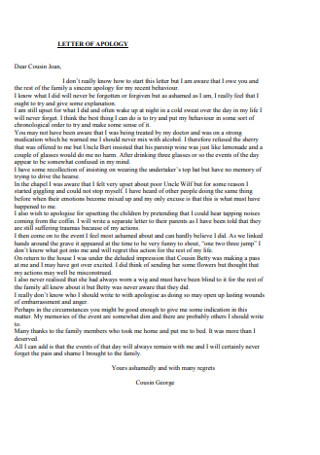
Simple Apology Letter
download now -
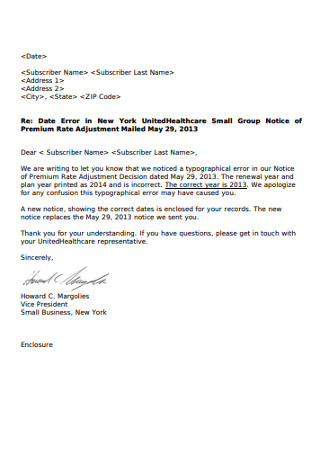
Business Apology Letter
download now -
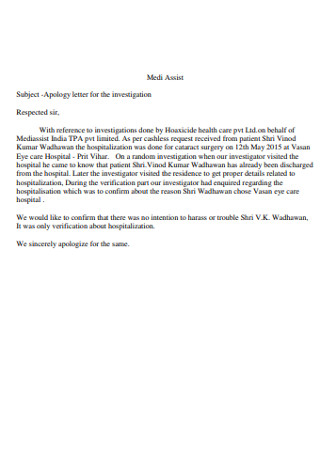
Apology letter for the investigation
download now -
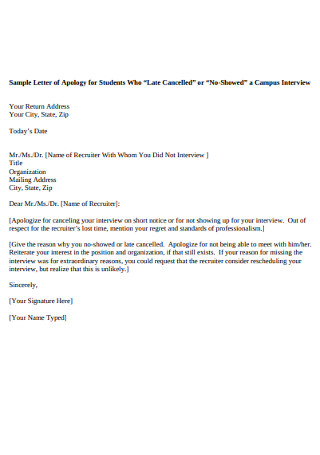
Sample Letter of Apology for Students
download now -
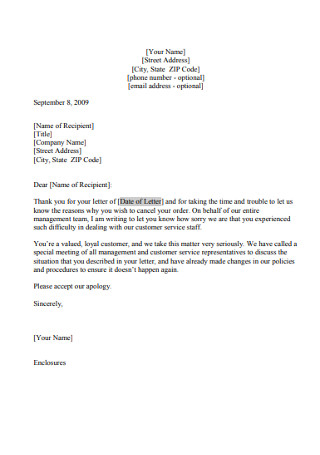
Letter of Apology after Customer’s Cancellation of Order
download now -
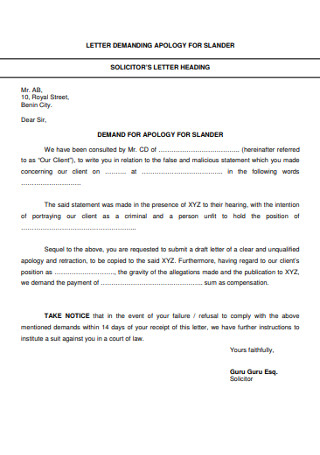
Letter Demanding Apology for Slander
download now -
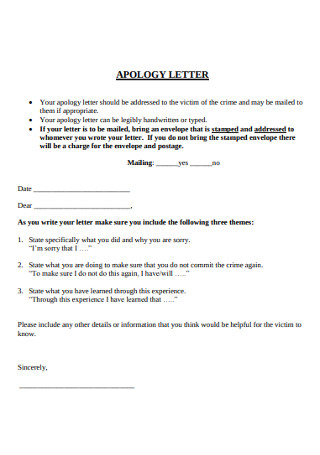
Parent Apology Letter
download now -
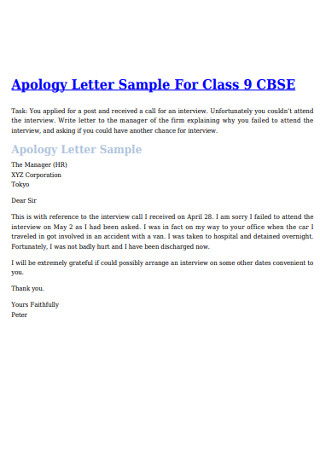
Sample Apology Letter for Class
download now -
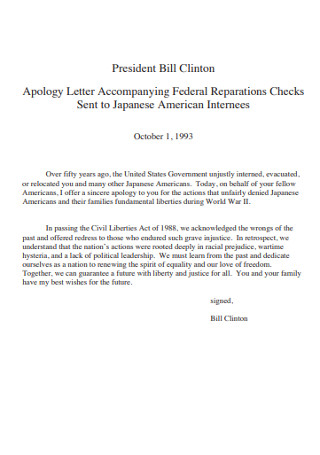
President Apology Letter
download now -
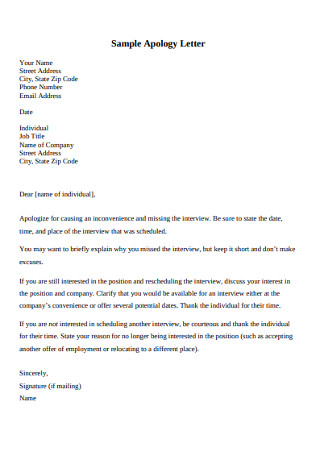
Sample Apology Letter Example
download now -
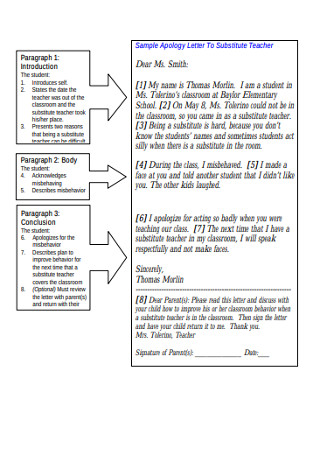
Sample Apology Letter To Substitute Teacher
download now -
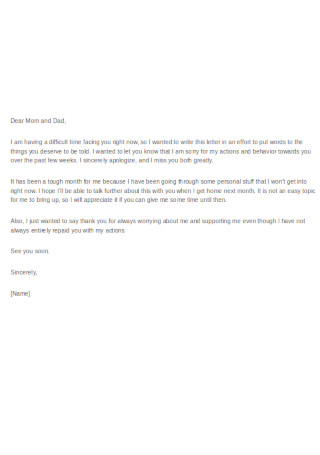
Sample Parents Apology Letter
download now
FREE Apology Letter s to Download
Apology Letter Format
Apology Letter Samples
What is an Apology Letter?
Why Is an Apology Letter Important?
What Are the Parts of a Standard Apology Letter?
The Two Types of Apology Letters
How to Create an Apology Letter
What Are the 5 A’s of Apology?
What should you do in an apology letter?
What should you not do in an apology letter?
What are some issues that businesses should apologize for?
How Do You Write a Good Apology Letter?
How Do You Write a Sincere Heartfelt Apology?
What Not to Say in an Apology Letter?
How Do You Write a Sweet Apology Message?
What Is a 5 Point Apology?
What Are the 3 Parts of an Apology?
How to Say Sorry in a Unique Way?
How Do You Give a Strong Apology?
What Does a Sincere Apology Look Like?
How to Apologize Without Saying “I’m Sorry”?
How to Say Sorry Professionally?
What is the Best Apology Text?
What Are Good Sentence Starters for an Apology Letter?
Download Apology Letter Bundle
Apology Letter Format
Sender’s Information
- Name:
- Address:
- City, State, Zip Code:
- Email Address:
- Date:
Recipient’s Information
- Name:
- Title:
- Organization:
- Address:
- City, State, Zip Code:
Salutation
- Dear [Recipient’s Name],
Body of Letter
- Introduction
- Briefly state the purpose of the letter and your desire to apologize.
- Explanation of the Issue
- Clearly describe what happened and why it was inappropriate or incorrect.
- Acknowledgment of Impact
- Recognize the effects your actions had on the recipient and express genuine remorse.
- Commitment to Change
- Detail the steps you will take to ensure the mistake does not happen again.
- Request for Forgiveness
- Politely ask for forgiveness and the opportunity to mend the relationship.
Closing
- Sincerely,
- [Your Name]
What is an Apology Letter?
An apology letter is a written expression of remorse for actions or words that have hurt another person. It serves as a formal acknowledgment of a mistake or misunderstanding and is a crucial step in repairing relationships in personal or professional contexts. The letter should clearly state the issue, express sincere regret, and detail any steps taken to rectify the situation or prevent future occurrences. Effective apology letters are empathetic and concise, aiming to convey genuine contrition and a commitment to positive change.
Apology letters are pretty self-explanatory—these are documents where you write and express your most heartfelt sorry about a particular mistake or any wrong matter. Besides a personal sworn statement of apology, a formal apology letter is crucial to ensure you write every correct detail in the most sincere manner and avoid being misconstrued. And with the tough cancel culture nowadays, people and businesses have to be very careful with their statements in an apology to be given a chance to change and correct matters.
According to research, 44% of Americans have at least heard about the term ‘cancel culture‘ as of September 2020.
Also, Small Business Trends reported that businesses may need to apologize for bad customer service, insufficient or damaged products, improper handling or late shipping of products, scheduling problems or cancellation reports, financial issues, incorrect employee actions, bad behavior, and missed deadlines.
Why Is an Apology Letter Important?
Apology letters are essential when there is an ongoing issue, inconvenience, or error to say sorry for. This practice is a much better alternative than staying silent and acting guilty. Also, the detailed letter can point out what the issue was, how to fix it, and what the person who apologized learned from the experience. So when recipients get to read your sincere statement of apology, they would understand your sentiments properly—that is, if written well.
Also, apology letters help you fight against liabilities, controversies, and most especially, the cancel culture. According to the Pew Research Center’s research survey, 44% of Americans have heard already about cancel culture as of September 2020. And this is where a certain person calls out about someone or an organization’s mistake by posting it online and it will get trending. Thus, the person or brand being called out will be considered ‘canceled.’ At least having a detailed apology gives a chance for people on social media to reconsider forgiving the ones that were called out rather than adding fuel to the fire.
What Are the Parts of a Standard Apology Letter?
An apology letter isn’t that hard to make when you familiarize its usual structure. Just like when you write any formal letter, there is a structure or format worth observing. And these are the important parts of a basic apology letter:
The Two Types of Apology Letters
It is known that apology letters come of two types—professional apology letters and personal apology letters. So what is the difference between the two? Here is a more detailed explanation of the two types of apology letters:
Professional Apology Letters
A professional apology letter is commonly used in the corporate or business world. An apology may be needed because of a company’s poor services, defective products, bad customer services, and other operations. And in apologizing, you can’t just attack your recipient personally because you have to be professional at all costs. Otherwise, your messages might be regarded as a threat and could end up in court. Statements here should focus on how to fix the issue since one’s professional reputation is on the line here. You may also see Confirmation Letter
Personal Apology Letters
Meanwhile, a personal apology letter is simply when you need to say sorry to someone whom you have hurt out of love, friendship, and other personal reasons. In this case, you can talk about personal matters and talk about how much you love the person or any other way. Also, there is no need for a strict format and structure in making personal letters. You may also see Acceptance Letter
How to Create an Apology Letter
From losing count of one’s absence, being late at submitting projects, down to losing a big amount of money—there are just so many possibilities of why you need to apologize. And if you learned from your mistake and remain genuinely sorry, be sure you know how to make a solid apology letter too. In fact, you only need these steps to ace it:
Step 1: Assess the Whole Situation First
First things first, what was the issue and how did it happen? Prepare an assessment checklist to ensure you can fully scrutinize the situation. The problem with making an apology letter right away without fully knowing the entire situation is you could have misinterpreted the incident and maybe fail to point out the crux of the matter. In doing so, record the subject matter, the problem, how to fix them, and other points worth adding to your letter later on. You may also see Authority Letter
Step 2: Select a Sample Apology Letter
Once you are fully aware of the drama or event, download from the list of sample apology letters listed above this article. Simply pick your favored template and you can slowly work your way towards completing the apology letter. Thus, you won’t need to begin from scratch with a blank document. Don’t forget that each sample is professionally made so they are decent options when you need to follow the best structure of these letters. Also, you can personalize them afterward so there is room for alterations. You may also see Nomination Letter
Step 3: Complete the Apology Letter’s Basic Parts
Speaking of completing your apology letter, don’t forget the basic parts of an apology letter, which was discussed earlier. Ensure that you got everything covered from the title or subject down to the complimentary close and signature. Also, finalize what type of apology letter you are making if it is a professional or personal one. Completing these parts already makes a solid apology. And for every detail written, verification is crucial so the output is error-free. You may also see Letter of Appreciation
Step 4: Observe Sincerity and Honesty with Your Words
The challenge in writing a letter is people can’t tell your expression in saying sorry. Hence, check the tone, sincerity, honesty, and language of your words. A deadpan message would not be considered a genuine apology. The key is to really reread what you wrote and check for possible improvements. Refine your message as well if you can’t seem to put a clear and sincere message. Remember that apologizing is not focused on defending yourself but to take responsibility for your actions and aim to be better. You may also see Relieving Letter
Step 5: Finalize the Letter’s Format and Design
Last but not least, think about your apology letter’s final format or design. Check if the font style and font size are legible enough to read and that your sentences are divided into paragraphs and proper spacing for a more arranged output. Also, decide if the letter should be printed and sent via mail, printed and sent personally, or maybe email it instead. There are lots of ways to distribute the letter as long as it will be sent to your recipient no matter what. You may also see Misconduct Warning Letter
What Are the 5 A’s of Apology?
The 5 A’s of apology provide a structured approach to making amends, similar to preparing a Permission Request Letter.
- Acknowledge: Admit to what you did wrong.
- Apologize: Say you are sorry for what you’ve done.
- Amend: Offer ways to make up for the harm.
- Assure: Reassure that you will not repeat the behavior.
- Ask: Request forgiveness to move forward. You may also see Guarantee Letter
What should you do in an apology letter?
Some steps you should follow in making the apology letter are:
- Use respectful language and tone.
- Always aim for an understandable and clear message to avoid misinterpretation.
- Organize your details with the standard letter format to create a smooth flow. You may also see Character Reference Letter
What should you not do in an apology letter?
In creating an apology letter, be sure to take note of the following:
- Write with quality so don’t just write for the sake of being forced to write the apology letter.
- Avoid misleading words and sentences as it may create more conflict instead.
- Most importantly, don’t expect recipients to forgive you immediately; some would take time. You may also see Recommendation Letter
What are some issues that businesses should apologize for?
According to Small Business Trends, a business apology letter may be needed in concerns related to bad customer service, improper handling or late shipping of goods, insufficient or damaged goods, scheduling conflicts or cancellation reports, financial problems, incorrect employee actions, missed deadlines, and bad behavior.
How Do You Write a Good Apology Letter?
Writing a good apology letter involves sincerity and clarity. This letter serves as a Contract Letter where you express regret and seek to mend a relationship.
- Acknowledge the Mistake: Clearly state what you did wrong without excuses.
- Express Remorse: Show genuine regret for your actions.
- Offer a Solution: Suggest how you will fix or improve the situation.
- Request Forgiveness: Politely ask for forgiveness to mend the relationship.
- Close Respectfully: End the letter respectfully, indicating hope for future relations. You may also see Vacation Request Letter
How Do You Write a Sincere Heartfelt Apology?
A heartfelt apology can mend even deep wounds. These are often more personal than a typical Consent Letter and should convey deep empathy.
- Personalize Your Message: Address the person by name, making the letter personal.
- Detail Your Understanding: Describe how your actions impacted them, showing empathy.
- Avoid Justifications: Focus on your remorse, not the circumstances.
- State Your Future Intentions: Reaffirm your commitment to do better.
- Offer Restitution: Where possible, offer to make amends in a meaningful way. You may also see Warning Letter
What Not to Say in an Apology Letter?
Avoid undermining your apology in a manner similar to what might happen in an improperly crafted Condolence & Sympathy Letter
- Skip Excuses: Avoid using any language that justifies your actions.
- Don’t Minimize: Never downplay the feelings or reactions of the other party.
- Avoid Blame-Shifting: Do not make the recipient feel responsible.
- Stay Clear of Conditions: Do not make your apology conditional on their response.
- Don’t Rush Forgiveness: Allow them time to process and accept your apology. You may also see Donation Letter
How Do You Write a Sweet Apology Message?
A sweet apology message lightens the mood, similar to a thoughtful Event Invitation Letter.
- Start With Affection: Open with a warm, affectionate line.
- Express Sincere Regret: Quickly state your regret to maintain sincerity.
- Highlight Positive Aspects: Remind them of the good parts of your relationship.
- Promise Improvement: Reassure them of your commitment to better behavior.
- End on a Hopeful Note: Close with a message of hope and affection. You may also see Referral Letter
What Is a 5 Point Apology?
A 5 point apology is a comprehensive method to ensure your apology covers all bases, akin to a detailed Authorization Letter.
- Admission of Wrongdoing: Clearly state what you did wrong.
- Acknowledgment of Harm: Recognize the impact of your actions.
- Apology: Sincerely say sorry.
- Action Plan: Discuss steps you will take to prevent future issues.
- Asking for Forgiveness: Ask for forgiveness to mend the relationship. You may also see Job Reference Letter
What Are the 3 Parts of an Apology?
The 3 parts of an apology ensure a clear, concise, and effective expression of regret, essential in a Job Letter of Recommendation.
- Expression of Regret: Start by expressing sincere regret for your actions.
- Explanation of What Went Wrong: Briefly explain what happened without making excuses.
- Offer of Reparation: Offer a way to make amends and ensure it won’t happen again. You may also see Sponsorship Letter
How to Say Sorry in a Unique Way?
Express remorse creatively by referencing shared memories or inside jokes. Personalize your apology to reinforce sincerity, like in a thoughtful Explanatory Letter.
How Do You Give a Strong Apology?
A strong apology openly acknowledges the mistake, addresses the hurt caused, and outlines tangible steps for amends, akin to the clarity in a Board Resolution Letter.
What Does a Sincere Apology Look Like?
A sincere apology includes clear acknowledgment of the wrongdoing, genuine regret, and a specific offer to make things right, similar to a heartfelt Letter of Employment.
How to Apologize Without Saying “I’m Sorry”?
Offer a direct acknowledgment of the impact of your actions and express a commitment to change behavior, aligning with the direct approach of a Proposal Letter.
How to Say Sorry Professionally?
In a professional setting, address the error directly, discuss the implications, and detail your plan for preventing future issues, reflecting the formal tone of an Explanation Letter.
What is the Best Apology Text?
The best apology text directly addresses the issue, expresses sincere regret, and asks for forgiveness, ensuring clarity and brevity like a Petition Letter.
What Are Good Sentence Starters for an Apology Letter?
“Please accept my apologies for…,” “I realize now that…,” and “I regret that…” are effective openers, offering support like a Letter of Support.
Crafting an effective apology letter is an essential skill that can help mend relationships and restore trust. This article provides you with practical formats, samples, and expert tips on how to articulate a heartfelt apology tailored to various situations. Whether it’s a personal misunderstanding or a professional misstep, understanding the components of an apology can facilitate a meaningful reconciliation. As you use these insights to compose your own letters, remember the power of a simple, honest expression of regret. Harness these tools to ensure your apology is not just heard but felt, solidifying the foundations of respect and understanding in any relationship. This skill is invaluable in personal growth and professional development, making it a fundamental aspect of any HR Letter toolkit.

